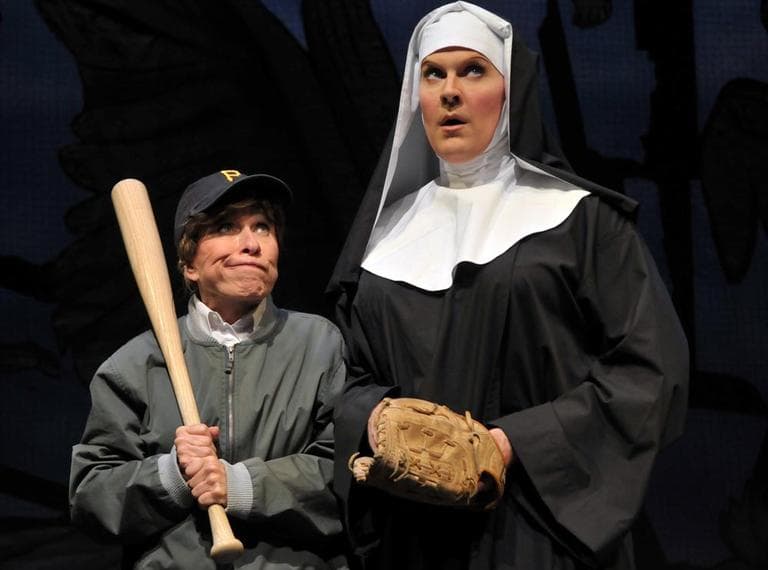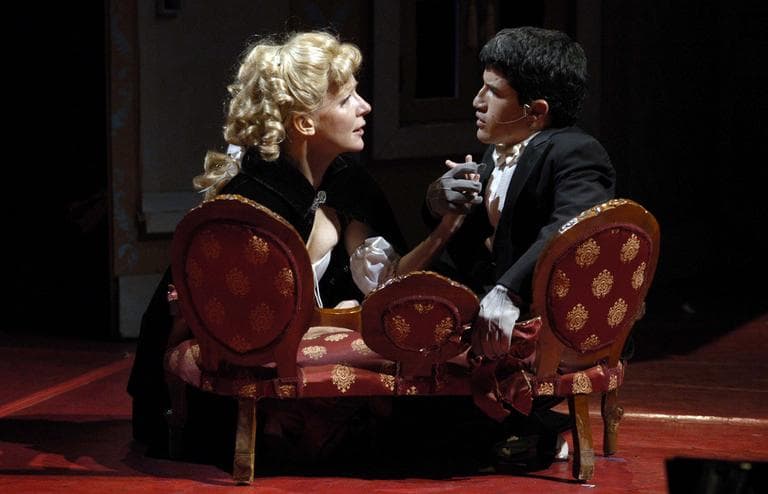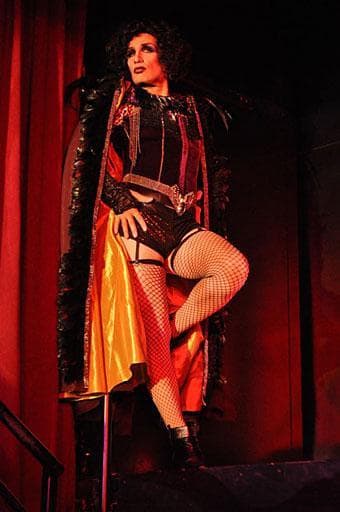Advertisement
Gender-Bending Roles Abound In This Season's Theater
WBUR’s critic-at-large reviews this fall's theatrical offerings.

Remember the days when men were men and boys were women? When Mary Martin as Peter Pan introduced a whole generation of baby boomers to the idea of gender bending? Calling Dr. Freud?
Actually, casting a woman as Peter goes back to 1904, when James M. Barrie wrote the play, but we live in a more literal and cynical age, so new versions don’t usually go looking for women as Peter.
But is the new version of “Peter Pan” now getting the “360” theater-in-the-round treatment under a tent in City Hall Plaza (through Dec. 30) any less imaginative than the the Broadway version with Martin, and eventually Cathy Rigby, not to mention Cyril Ritchard as Captain Hook and Mr. Darling?
Not when it comes to special effects, certainly. They’re pretty eye-popping, whether it’s Wendy and her brothers learning to fly as projections of London go whizzing by them, or the alligator who ate Hook’s hand stretching its head into the audience. The alligator himself (herself?) is driven by a pair of humanoids with all the skill of “Lion King” puppeteers. And the flying is on a whole other level from the divine Miss Mary, with an athleticism that might even have impressed Miss Cathy.
The acting, alas, will impress fewer folks. Chuck Bradley’s Peter seems more demented than dashing as he pouts and preens.
Josh Swales is equally charisma-challenged as Hook/Darling, but he and Bradley are hardly alone. Emily Yetter’s Tinker Bell and Heidi Buehler as Tiger Lily are really the only shining lights in the cast.
Tanya Ronder’s script doesn’t shy away from Barrie’s dark side — Hook slits a pirate’s throat, for example — but it’s still fairly dorky. Unless you have a young one with you, I don’t know that you want to spend any time in this version of Kensington Gardens.
For The Adults

There is some pretty inspired gender bending going on in Boston, though in this case it’s a man playing a woman. But what a man! Jeffery Roberson is better known as Varla Jean Merman, a drag artist supreme, and SpeakEasy Stage Company had the inspired idea of casting him/her as Mother Superior in “The Divine Sister,” Charles Busch’s hilarious send-up of Hollywood movies about women of a certain habit — nuns.
If you’re easily offended by campy send-ups of organized religion, then the Roberts Theatre at the Boston Center of the Arts is not the place to be (through Nov. 19). Unless, that is, your passion for good theater overrules that sensibility.
The ensemble acting under Larry Coen’s rapid-fire direction, featuring Paula Plum and Kathy St. George, is out of this world in a story about a church in financial difficulty. But oh, those subplots — heretics loyal to Jesus’ sister, Joyce; a Jewish philanthropist; a journalist who was involved with Mother Superior before she entered the Church and an inside joke about Peggy Wood and Julie Andrews in “The Sound of Music” that you’ll have to hear for yourself.
This is one you don’t want to see with that aforementioned young one. So call Nana to babysit and have yourself a riotous time with SpeakEasy. Get thee to this nunnery. By the way, if you combined “The Divine Sister” and “Peter Pan,” you’d have “The Flying Nun.”
Early Stoppard
One of the exciting aspects of Boston theater these days is that as a company like SpeakEasy establishes itself in the firmament of Boston theater, new young troupes with strong sensibilities of their own stake their claim on the consciousness of theatergoers.
On the basis of its excellent production of Tom Stoppard’s early brain-teasers, “Dogg’s Hamlet, Cahoot’s Macbeth,” Whistler in the Dark Theatre is clearly a company to keep our eyes on.
This is not easy material. “Dogg’s Hamlet” involves mastering a made-up comic language and physical dexterity while “Cahoot’s Macbeth” mandates straight faces in an Orwellian other world, and they both have to work together. And this talented company, under Meg Taintor’s sure-handed direction, doesn’t miss a beat.
“Hamlet” opens with three students speaking Dogg who combine with an English-speaking deliveryman to stage a version of “Hamlet” that involves a nerdy but tyrannical headmaster as Claudius. “Macbeth” revolves around an underground performance of the play, with reverberations about the importance of art in speaking truth to power, even when a play is only seen by a handful of people. (Shades of the final, transcendent episode of “Slings & Arrows.”)
This production at the Black Box Theatre at the BCA (through Nov. 19) is also set up to be seen by a small group of people. Be one of them, particularly if you’re a Stoppard fan. (It’s in repertory with another company, Imaginary Beasts, performing Eugene Ionesco’s “Macbett,” which hadn’t opened as of this writing.) I can’t wait to see what Whistler in the Dark does with its upcoming Caryl Churchill productions.
Mabou Mines DollHouse

Lee Breuer, like Stoppard, has some of his roots in the mid-century Theater of the Absurd and Theatre of Cruelty movements, evidence of which is on display in the latest inspired import by ArtsEmerson, “Mabou Mines DollHouse,” at the Cutler Majestic Theatre, (through Nov. 6) in which all of the male parts are played by men under 4-foot-5.
All the action in this version of Ibsen’s classic takes part on a tiny set that underscores the dollhouse notion of Nora’s infantilization as the trophy wife of a Norwegian businessman. The first act is fairly humorous as the exceptional Maude Mitchell speaks a babyish form of English with Scandinavian accents, but as the second act grows more laden with tragic possibilities, the whole production takes on increasingly ominous freight.
And what of the men in the cast? Their relatively small size heightens (sorry) the diminishment of women, which is what makes this production alternatively funny and frightening –- and emblematic of the themes that Ibsen was originally dealing with. Unlike the Stoppard plays, this relies on some relatively spectacular stagecraft –- not as high-powered as “Peter Pan,” but pretty eye-popping in its own right, particularly the puppetry. “Mabou Mines DollHouse” has traveled the world and the Nov. 6 production will be its last.
'Before I Leave You'
I would love to say that the Huntington Theatre Company’s championing of a local 70-something playwright has resulted in the discovery of a major new voice in American theater. But there’s no such Hollywood ending in store for Rosanna Yamagiwa Alfaro’s poorly written world premiere, “Before I Leave You.”
That this is being staged at the BCA’s largest theater (through Nov. 13) and features some fine local talent speaks volumes of what the Huntington has meant to both Boston theater and the BCA. But the bar for the Huntington itself needs to be higher when it comes to the plays it stages. “Before I Leave You” is set in Cambridge and features four of the five most unlikable characters I’ve ever met in that city. The fifth is merely bland.
Together they combine to bore us with the details of their infidelities, fears of aging, and unengaging eccentricities until you wish that they, like Ibsen’s Nora, would at least have the common sense to shut the door and just walk away from their foolish families and inconsequential lives.

Rocky Rocky
Ryan Landry and his troupe, the Gold Dust Orphans, have carved out a niche at Machine in the Fenway Park area for campy satires of movies and plays that inspire comparisons to Charles Busch of “The Divine Sister.”
So it seemed like a natural to have Landry and company take over Oberon, the American Repertory Theater’s second stage, on late Friday nights (through Dec. 2) for a version of Richard O’Brien’s “Rocky Horror Show” (later made into the cult movie). But it just seems bloated and un-clever, particularly when compared to Landry’s more personal work or to SpeakEasy’s “The Divine Sister.” The group of young folk on the dance floor next to me, who were obviously stoned out of their gourds, loved every minute of it. I just wanted to be back at Machine, where Landry really shines.
This program aired on November 3, 2011. The audio for this program is not available.
